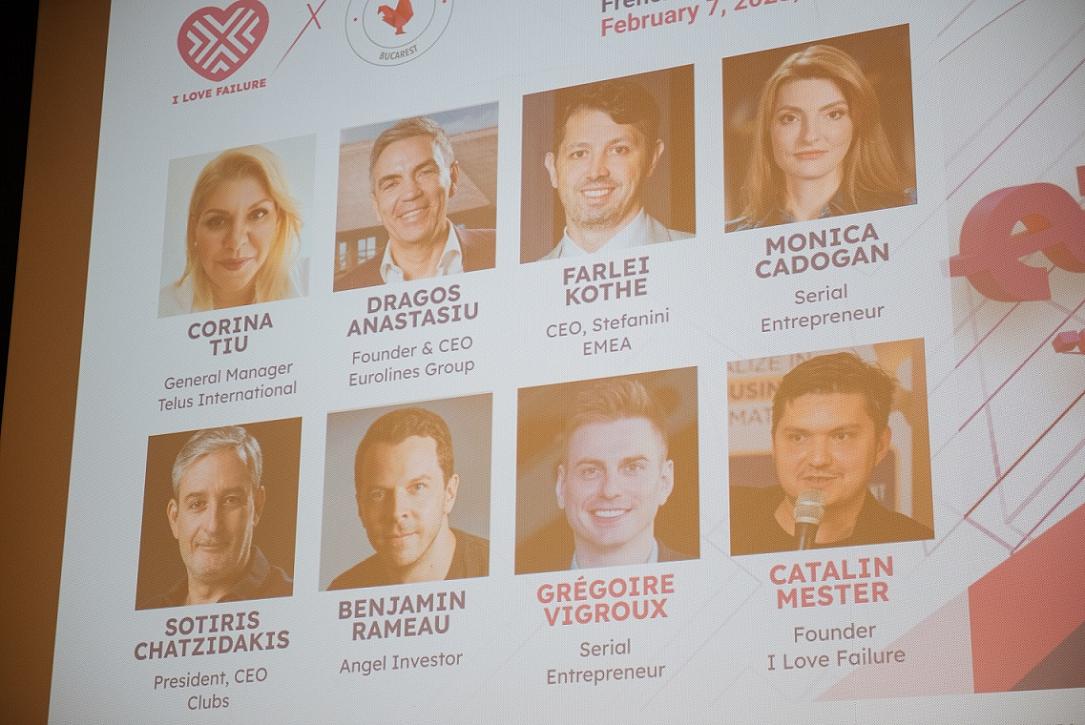Failure is a good teacher: Entrepreneurs and executives share stories of challenging times at Bucharest event



Stories of professional fiascoes are not often shared publicly in the startup and corporate world, but getting to know them can help many take a more constructive approach to them.
A recent event organized by La French Tech Bucharest and I Love Failure, a Bucharest-born community working to change the common perception of and fear of failure, gave the audience a chance to hear how several business leaders and entrepreneurs relate to failure and the value they place on their professional setbacks.
Why do we need to hear more stories of failures? Cătălin Meşter, the founder of I Love Failure, argued that an ‘I love failure’ education is needed because failure is a way to learn. Failures are part of any success story, but getting to speak about it and own that particular story, with all its missteps, is a way to acknowledge and understand a particularly challenging experience. Besides, failures are more exciting, he argued, as there is more to learn from them.
Building on the idea that failure is a way to grow, Monica Cadogan, an entrepreneur and former CEO of Vivre.ro, spoke of the importance of remembering that one business’s success story is another one’s failure, and someone’s success can be someone else’s failure. Likewise, on a personal level, what may look like success at one point, can be perceived as a failure at another. What is important, she argued, is to learn from any difficult experience and adjust the behavior, either at work, at home, or in the community.
In his turn, entrepreneur Dragoș Anastasiu, the founder of Eurolines Group, pointed to how difficult it is to speak about failure as we are often educated to be successful and told that we need be the first at what we do. However, failures cannot and shouldn’t be avoided, as they can become learning opportunities, he explained, sharing with the audience the story of how failure is often a matter of perspective. Anastasiu, who trained as a doctor and practiced medicine for several years in Germany, made a radical change when he decided to return to Romania and become an entrepreneur. From his family’s perspective, the decision at that time met all the requirements to be labeled a failure, but to him, it was the best choice he could have made, he explained. At the same time, being able to contextualize both successes and failures is an important part of learning from them, he explained, referencing several business experiences.
Zooming in on the experience of being open to change and willing to embrace it, Sotiris Chatzidakis, the president of CEO Clubs in Romania, spoke of how the value of failure resides in the analysis of it and in the ability to change fundamentally for the better. It takes courage to be able to change, and not being open to doing that can lead to failure, he explained.
Corina Tiu, the GM of Telus International, shared with the audience the experience of a school-related failure driven by overconfidence and explained that learning how to fail should be viewed as a skill like any other. This can go hand in hand with better ‘expectations management’ from ourselves and others. Failure is only learning by doing, and we should teach children that failure is normal, she argued.
Bringing in his experience of entrepreneurship and the corporate world in Brazil, Farlei Kothe, the CEO of Stefanini EMEA, reflected on the many aspects that one needs to navigate between success and failure, from an individual mission for a company to outlining a business vision, from relying on tech skills to developing soft skills and resilience, and balancing knowledge and experience. He also pointed to how crises can provide the right environment to learn, unlike an unchallenging situation.
Speaking of his experience of the finance world, angel investor Benjamin Rameau reflected on how, without insight and the ability to change, what starts as success can lead to failure. What looks successful, repeated without analysis and change, can lead to failure, even more so when technology-driven changes are involved.
(Photo courtesy of La French Tech)
simona@romania-insider.com